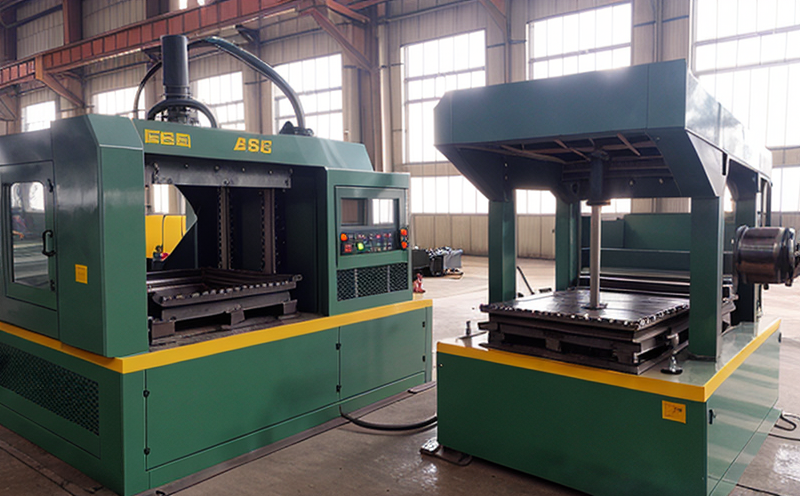ASTM A745 Straight Beam Ultrasonic Testing of Forged Components
The ASTM A745 standard specifies procedures and requirements for straight beam ultrasonic testing (UT) of forged components. This service is particularly crucial in industries where high-strength, integrity-critical parts are paramount, such as aerospace, automotive, and heavy machinery manufacturing.
Forged components undergo significant deformation during the forging process to achieve precise geometry and mechanical properties. These processes can introduce defects like cracks, porosity, or non-uniformities that could compromise safety and performance if not detected early in the production cycle. ASTM A745 UT addresses this by providing a robust method to inspect these parts for internal flaws.
The technique involves directing high-frequency sound waves into the component using a transducer. As the sound travels through the material, any interruption or change in the wave's path due to defects is detected and recorded. This non-destructive testing (NDT) approach ensures that critical components can be evaluated without altering their structural integrity.
ASTM A745 UT employs a straight beam probe that allows for precise focus and high-resolution imaging of flaws within the component. The standard specifies detailed requirements on test equipment, including transducer frequency, coupling methods, and testing parameters to ensure consistent and reliable results across different facilities.
The acceptance criteria outlined in ASTM A745 are stringent and designed to maintain the highest standards of quality. Components failing these tests must be reworked or scrapped, ensuring only defect-free parts enter further manufacturing stages. This process not only enhances product reliability but also reduces the risk of failures during operation.
For aerospace applications, for instance, where forgings are subjected to extreme stress and environmental conditions, ASTM A745 UT provides an essential layer of quality assurance. Similarly, in automotive sectors, ensuring that critical parts like engine components or structural frames meet these stringent testing standards is crucial for safety and durability.
Customer Impact and Satisfaction:
- Enhanced Product Reliability: ASTM A745 UT directly contributes to the reliability of forged components, which are critical in high-stress environments. By detecting flaws early, this service helps prevent potential failures that could lead to costly downtime or safety hazards.
- Compliance Assurance: Compliance with international standards like ASTM A745 ensures that products meet regulatory and industry requirements, thereby reducing the risk of non-compliance penalties and maintaining a strong market reputation.
- Reduction in Wastage: By identifying defects before further processing, this service minimizes material wastage and associated costs. This efficiency is especially valuable in sectors like aerospace and automotive, where materials are often costly.
Quality and Reliability Assurance
The ASTM A745 straight beam ultrasonic testing service plays a pivotal role in ensuring the quality and reliability of forged components. By adhering strictly to the standard's procedures, laboratories can deliver consistent results that are both accurate and reproducible. This consistency is crucial for maintaining high standards across all production batches.
Quality assurance (QA) begins with rigorous training and certification of personnel involved in the testing process. Only certified operators using calibrated equipment can perform ASTM A745 UT, ensuring that every test is conducted under controlled conditions. This control extends to environmental factors like temperature and humidity, which could otherwise influence sound wave propagation.
The QA process also involves regular calibration checks of all instrumentation used in the testing. These checks ensure that the equipment remains accurate throughout its operational life, thereby maintaining the integrity of test results. Additionally, laboratories must have robust quality control measures in place to verify the accuracy and consistency of each inspection.
Compliance with ASTM A745 is not just about meeting industry standards; it's also about building trust with customers. By consistently delivering results that meet or exceed these stringent requirements, laboratories can establish a reputation for excellence. This reputation translates into long-term business relationships and increased customer satisfaction.
Customer Impact and Satisfaction
- Enhanced Product Reliability: ASTM A745 UT ensures that forged components are defect-free, enhancing their reliability in demanding applications. This reliability is particularly important for industries like aerospace, where component failures can have catastrophic consequences.
- Compliance Assurance: By adhering to ASTM A745 standards, manufacturers ensure compliance with international regulations and industry best practices. This compliance reduces the risk of non-compliance penalties and enhances market reputation.
- Reduction in Wastage: Early detection of defects through ASTM A745 UT minimizes material wastage, thereby reducing production costs. This efficiency is especially beneficial for industries where materials are expensive or difficult to source.
Environmental and Sustainability Contributions
The ASTM A745 straight beam ultrasonic testing service contributes positively to environmental sustainability by promoting efficient use of resources. By minimizing material wastage through early defect detection, this service helps reduce the overall carbon footprint associated with production processes.
In addition, the non-destructive nature of UT ensures that components are not compromised during inspection, preserving their integrity for further processing or use. This approach is particularly beneficial in industries where parts are expensive and difficult to replace.
Moreover, by ensuring high-quality products from the outset, ASTM A745 UT helps reduce the need for rework or scrap, which can lead to significant waste generation. This efficiency contributes to a more sustainable manufacturing process, aligning with broader environmental goals.





